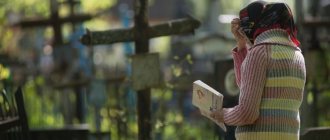The theme of death is one of the key ones in any religion. And this is not surprising, because it is precisely the thoughts about the inevitable departure to the Eternal World that largely determine the behavior of believers in earthly life. In Islam, great attention is paid to ensuring that a person receives a better fate after death. Relatives, friends and relatives of the deceased, as a rule, pray to the Almighty to place the soul of the deceased in the Garden of Eden and forgive his sins. Various prayers - duas - serve this purpose, which this article will tell you about.
Dua at cemetery No. 1
مِنَ الْمُؤْمِنِينَ وَالْمُسْ لِمِينَ، وَيَرْحَمُ اللَّهُ الْمُسْتَقْدِمِينَ مِنَّا وَالْمُسْتَ أْخِرِينَ، وَإِنَّا إِنْ شَاءَ الله بِكُمْ لَاحِقُونْ
“As-salamu 'ala ahli-d-diyari mina-l-mu'minina wa-l-muslimina, wa yarẍamullahu-l-mustaḱdimina minna wa-l-mustahirina, wa inna inshaAllahu bi-kum laẍiḱun”
Meaning: “Peace to the believers and Muslims lying here, may Allah have mercy on those of you and us who left earlier and those who stayed behind, but we, if Allah Almighty wants, will join you” (Imam Muslim).
Is it possible to perform Janaza prayer on non-Muslims?
Janazah prayer according to the Sunnah is not allowed for unbelievers. Islam prohibits asking in prayer for infidels before Allah Almighty, therefore janaza prayer is not performed on infidels. The Muslim community unanimously decided to prohibit performing janaza prayers over infidels.
In the Holy Quran, Allah Almighty says: “ Never pray over one of them who has died, and do not offer a prayer over his grave, for truly, they did not believe in Allah and His Messenger and died being wicked! "(Sura At-Tauba (Repentance), 84th verse).
Even if the deceased is a close relative of a Muslim, but was an infidel during his lifetime, it is still impossible to ask Allah for forgiveness for him, since the verse of at-Taubah says that “It is not appropriate for the prophet and those who believe to ask forgiveness for polytheists, even if they were close relatives to them, after it became clear to them that they were the inhabitants of Fire! "(Sura At-Tauba (Repentance), 113th verse).
Dua at cemetery No. 2
All rights reserved. ءَ الله بِكُمْ لَاحِقُونْ
“As-salamu 'alaikum, dara ḱavmin muminina, wa inna inshaAllahu bikum laẍiḱun.”
Meaning: “Peace be upon you, O those who are in the abode of the believers, but we, if Allah Almighty wants, will join you” (Imams Abu Dawud and Ibn Majah).
Is it possible to perform janazah on several bodies at once?
According to Imam an-Nawawi, it is better to pray separately over each body rather than over several bodies at once.
If janaza prayer is performed for both a woman and a man at the same time, then the body of the man or men is first placed in front of the imam, and only then the women. Even if we are talking about a child and a woman, if the child is a boy, then the child’s body is placed in front of the imam, and only the woman’s body is placed behind him.
Also, janaza prayer was performed simultaneously over several deceased people, among whom were women. As evidence, they cite the hadith transmitted by Ibn al-Jarud, an-Nasai and ad-Darakutni from the words of Nafia that when Ibn Umar performed prayer over nine bodies of the dead at once, the men lay first in front of the imam, and only then the women were placed.
Dua at cemetery No. 3
All rights reserved. ا وَلَكُمْ، أنْتُمْ سَلَفُنَا وَنَحْنُ بِالْأَثَرِ
“Assalamu 'alaikum, I am ahla-l-ḱubur! Yafirullahu lyana wa lakum! Antum salafuna, wa naẍnu bil-aҫar.”
Meaning: “Peace be with you, O you who lie in the graves! May Allah forgive us and you! You left before us, and we will soon follow you” (Imam at-Tirmidhi).
A hadith reported by Ibn Abbas says: “If a Muslim passing by the grave of his brother (Muslim), whom he knew during his lifetime, gives him salam, then the deceased recognizes him and returns this greeting” (Ibn Abd al-Barr).
A person who intends to visit the graves of the deceased should study the ethical standards of visiting a cemetery, remember that he himself will also die and go there, strive to achieve the pleasure of the Lord, revive his callous and vicious heart, benefit the deceased, read the Sacred Scripture near him Koran, perform ablution before going to ziyarat, hoping that the Almighty will accept his prayer, read in a state of ritual purity.
Having reached the cemetery, you must be careful not to step on the graves; you should remember those who rest in this land and reflect on this. Reflect on how they left their loved ones and relatives, how their body organs decayed in their graves, how their wives were widowed and their children were orphaned. It is necessary to behave with them as respectfully as you did during their lifetime. It is necessary to greet them, read something from the Koran there and then a prayer.
May the Almighty accept all our duas and forgive the sins of those who have passed into another world! Amine.
Did you like the material? Please tell others about this, repost it on social networks!
Source
Conditions
If a Muslim intends to perform Janaza prayer, he must fulfill several conditions:
- Only one who has performed ghusl or complete ablution can perform the funeral prayer;
- the person performing the funeral prayer must be in a state of voodoo or taharat, that is, low ritual purity;
- the place in which it is planned to conduct Janaza prayer must also be clean;
- The body of the deceased, over whom Muslims perform funeral prayers, must also be washed.
Janazah prayer includes several fards:
- Kyyam or standing.
- Takbir (the words “Allahu Akbar”) should be said four times.
- Salavat on the Prophet Muhammad ﷺ.
- Prayer for the deceased.
- The words “Assalamu alaikum” at the end of the prayer.
Maybe
Will reading a dua help the deceased?
In the Muslim faith, caring for the soul and its fate after bodily death is important. Relatives of the deceased make obligatory dua for the deceased while visiting the graves, asking Allah to rest the spirit, settle it in paradise, soften the fate, and forgive sins.
Eternal life begins from the grave. The soul leaves the body, but continues to see, feel, feel sad, rejoice, worry. Relatives can express their thoughts to the deceased while visiting his grave.
The souls of the departed need prayers. After death, all human affairs cease, with the exception of three, the reward for which is counted even after death: constant alms, knowledge from which the living benefit, and true believing descendants who offer prayers for their ancestors.
Praying for departed loved ones is like a lifeline that prevents afterlife torment. Duas for descendants when visiting graves will help elevate the righteous in the eyes of Allah.
A person who offended his living parents, brought them torment, but diligently makes dua for them after death, and visits their graves, can be forgiven by the Almighty.
Prayers of the living for the departed:
History of funeral duas
The tradition of praying in a special way for the dead dates back to the earliest years of Islam. Even in the biography of the Prophet Muhammad, it is mentioned that usually, after the burial was completed, he stood for several minutes at the grave, and then addressed those gathered: “Pray (your Creator) for forgiveness for your brother (sister) and ask Allah (him or her) to strengthen , for, verily, now he (she) is being asked questions.”
Later, remembering brothers and sisters who had passed on to another world, Muslims created many special duas that can be read both in their native language and in Arabic. Today they are mainly contained in the collections of hadiths (sacred prayer texts) of Ibn Majah, Ibn Daud and Ahmad. As a rule, they are dedicated to requests to the Almighty to make the posthumous fate of the deceased brighter, and the tests intended for him easier. Those who pray ask Allah to give the deceased in the afterlife a new home better than his previous home, a family better than his family, and a wife better than his wife, to enter him into paradise and protect him from the torment of the grave and from the torment of fire.
Types of dua to read after the death of a loved one
Dua is important for faithful Muslims. It is not as uncompromising as prayer. Prayer when visiting graves can be performed in any language. During prayer, a person is humble, admits that he is powerless before the Almighty, accepts what he has sent - illness, health, sorrow, joy. The believer humbly asks for help and protection. Prayers can be read at any time.
The time of grief, farewell to the departed, and the hours of visiting the graves of the deceased are accompanied by an appeal to Allah.
At the moment of death, when the deceased’s eyes are closed, they pray to the Almighty:
Alahhumyagfir darrajyattakhu vil-maddiinnya uahkhlyuvhu fi akkybikhhi fil-gabbirinya uggfirylyanya wa lyakhhu ya rabyall allyamin. Uaffsi lyakhhu fi kabrihi ua nyauir lyakhhu fifih.
Allah, forgive the deceased, raise his level, forgive both us and the deceased, O Almighty. Make his grave wide, light it for him.
During the burial, when visiting the graves, an appropriate atmosphere is observed. The prayers are read in a quiet voice with reverence, not allowing worldly topics in conversations, not allowing the peace of the dead to be disturbed. Women are prohibited from attending the funeral, as they may not be able to contain their emotions when saying goodbye.
At the entrance to the cemetery
Visiting the dead is sunnah. Previously, ziyarats to graves were prohibited due to strong pagan traditions. Subsequently, the envoy pointed out the desirability of visiting the cemetery. Wisdom is hidden in ziyarat. A person thinks about death and the soul, offers prayers for the departed. Near the graves, the strength of the faith of a true Muslim grows stronger.
Visiting graves is allowed at any time. In and around the cemetery it is worth greeting the dead as they were greeted during life. Then you need to offer dua to the Almighty for the departed.
Aisha reported that the Messenger of Allah went to the Al-Baqi cemetery and said:
Peace be with you who are in the world of believers. You have found what everyone was promised. And tomorrow our time will come. And if Allah decides so, we will be with you. Oh, Almighty, forgive the departed.
To Aisha’s question about what to say when entering the cemetery, the prophet ordered to greet those lying in their graves and offer dua to Allah for them.
At the funeral
After the burial, those present make a prayer for the Almighty to forgive the sins of the deceased.
It is forbidden to recite verses from the Koran during a funeral. The Messenger of Allah did not recite surahs at the burial site, and followers read dua at funerals and when visiting graves.
The text of the dua at a funeral is arbitrary; gratitude is given to Allah, a request to take care of the soul of the deceased.
In the Muslim religion, funerals are not allowed. After the funeral, they pray for the deceased, visit holy places, give alms, perform Hajj, and read dua. Funeral dinners are an innovation that true Muslims do not welcome.
The meaning of dua at a funeral near the grave:
Oh, Almighty, forgive his sins and free him from the torment of the grave. Do him a favor, make a spacious grave, free him from his sins.
They pray to Allah to grant the deceased a home and family in heaven, they ask him to forgive his sins and save his soul from suffering.
When visiting graves
A person performing ziyarat on a grave should behave as if he had come to visit a living person. During the visit, the living one makes a dua and asks for mercy for those lying in the ground. It is necessary to read the Koran a lot, to show hell to the buried.
When visiting graves, the Muslim prayer for the dead is read in your own words. Conditions:
When visiting the home of the deceased
Condolences to the relatives of the deceased are sunnah. The Messenger of Allah expressed his condolences. The Prophet expressed sympathy for the companion who lost his child.
A Muslim is obliged to remind the relatives of the deceased about patience and acceptance of grief. There is no need to be annoyed with fate or complain about the will of Allah.
The text of the dua when visiting the house of the deceased contains a prayer for relief from the suffering of relatives:
The Almighty will reward you with greater reward, ease grief and grant forgiveness to the deceased.
The envoy, during a visit to the house, expressed sympathy for his daughter who had lost her child, saying:
To Allah belongs what he took to himself, what he gave you. The Almighty has determined a deadline for everything. Show humility and thank Allah in the hope of reward.
The person receiving condolences must ask Allah to reward the person who visited his home.
Janazah prayer for women
Janaza prayer over Princess Al-Jawhara bint Abdulaziz in the Haram Mosque
The funeral prayer for a woman is read in the same way as for men, with the only difference that the imam does not stand in front of the head of the deceased, but stands at the level of the middle of the body of the deceased.
Can women perform Janaza prayer? According to Aisha, quoted in a hadith narrated by Muslim, after the death of Said ibn Abu Waqqas, the wives of the Prophet Muhammad ﷺ ordered him to be taken to the mosque so that they could perform the funeral prayer over him. This hadith, according to Sheikh Safiyya-Rrahman al-Mubarakfuri, is proof that women can perform the janazah prayer and there is no prohibition on it.
Dua texts for a cemetery
Allah hears all appeals and requests. He knows the intentions of those who recite the dua, regardless of the language of prayer. The Almighty knows the words and thoughts of the one asking. The main thing is sincerity, worship of Allah, humility, faith. Etiquette for visiting the dead:
In Kumyk language
Duas when visiting cemeteries and the graves of the deceased are pronounced in the Kumyk language according to the same principles as in other languages. In them one hears a call to humility Etme kui ek:
Assalamu 'ala ahhli-d-diyarri minna-l-mu'mininna val-muslimina, wa yarhamu-Llahhu-l-mustakdiminna minna val-mustahirina, wa in-na in shaa-Lahu bikum lahykunn.
Peace to the believers and Muslims lying here, may Allah have mercy on those of you and us who left earlier and those who stayed behind, but we, if Allah Almighty wants, will join you.
In Avar language
The main duas when visiting a cemetery in the Avar language:
Bolon duniyal bolyon duniyal is more necessary, those who are below the abode of those who believe below, the Almighty Allah wants, let us join the more necessary below.
Muslim tradition involves frequent reading of prayers. Duas are appeals to the Almighty and such appeals can take any form, unlike prayer. Communication with the Lord accompanies all areas of a believer’s life, including visiting the graves of the dead.
Muslims honor their ancestors, according to the Koran, respect the righteous even after their death. Before visiting the graves of relatives and friends, a Muslim reads dua, which reminds that all people are mortal and everyone will appear before Allah, each in his own hour.
Source
Muslim prayer for family and friends
We will try to answer the question in detail: Muslim prayer for family and friends on the website: prayer-to-god.rf - for our dear readers.
In the Religion, Faith section, to the question: Muslim prayer for family and friends? asked by the author Ivan Tatarsky the best answer is
And that there are no prayers in the Koran. In the Gospel there is at least the “Our Father”, there is a prayer book and a psalter separately. Dear Muslims, how come you pray 5 times a day? Don't think that I think badly.
Of course, I could be wrong, but it seems to me that such prayers do not and cannot exist in Islam. Muslims glorify Allah five times a day with the words of his messenger, who gives health, illness, prosperity, children, and death. To whomever he wishes, naturally
Dua at the cemetery
It is sunnah to visit our dead who are buried in the cemetery. At the very beginning of his call, the Messenger of Allah (peace and blessings of Allah be upon him) prohibited ziyarats (visits) to cemeteries, since at that time visiting cemeteries was intertwined with various false beliefs.
The purpose of this prohibition was to prevent people who had only recently accepted Islam from saying at graves what was customary to say during the days of Jahiliya. However, later, when the Islamic faith became stronger in the hearts of the followers of Muhammad (peace and blessings of Allah be upon him), he allowed his companions (may Allah be pleased with them all) to visit cemeteries so that the living could learn from this and make dua for the dead.
The Messenger of Allah (peace and blessings of Allah be upon him) not only allowed, but also indicated the desirability of ziyarat for the deceased. Confirming this, he himself visited cemeteries.
Buraidah (may Allah be pleased with him) reported that the Messenger of Allah (peace and blessings of Allah be upon him) said:
كُنْتُ نَهَيْتُكُمْ عن زِيَارَةِ القُبُورِ فَزُوروها
“ Before, I forbade you to visit cemeteries, but from now on, visit them .” ( Muslim )
Another version of this hadith reports that the Prophet (peace and blessings of Allaah be upon him) said:
القُبُورَ فَلْيَزُرْ؛ فإنَّهَا تُذَكِّرُنَا الآخِرَةَ
«. and whoever wishes to visit graves, let him visit, for, truly, they will remind him of death ».
As the Messenger of Allah (peace and blessings of Allah be upon him) pointed out, there is great wisdom in visiting cemeteries. This reminds a person of death, of Akhirat, and he makes dua there for the dead.
There is no specific time for visiting cemeteries, so you can visit them at any time. A person who comes to a grave for ziyarat should behave in the same way as if he had visited that person before he died.
Anyone who comes to a cemetery or someone who passes by it should first greet the inhabitants of the graves. After this, it is advisable to turn to the Almighty with prayers for the dead.
It is reported from the words of Aisha (may Allah be pleased with her) that at the end of every night that the Messenger of Allah (peace and blessings of Allah be upon him) spent with her, he went out to the Al-Baqi cemetery and said:
All rights reserved. All rights reserved. اللَّهُمَّ اغْفِرْ لأهْلِ بَقِيعِ الغَرْقَدِ
«As-salamu 'alay-kum, dara kawmin mu'minina, wa ata-kum ma tu'aduna, gadan muajjaluna, wa inna, in sha Allah, bi-kum lahikuna. Allahumma-gfir li-ahli Baki'i-l-Gharkad ».
“Peace be upon you, O those who are in the abode of the believers, what was promised to you has come to you, and tomorrow our time will come, and truly, if Allah Almighty pleases, we will join you. O Allah, forgive the deceased on Baki' al-Gharkad! ( Muslim )
It is also reported from 'Aisha (may Allah be pleased with her) that one day she asked: “O Messenger of Allah, what should I say?” - meaning a visit to the cemetery. The Prophet (peace and blessings of Allah be upon him) replied:
قُولي: مِنَ المُؤْمنينَ وَالمُسْلمين اللَّهُ كم لاحقون
«Say: “As-salamu 'ala ahl-d-diyari min-l-mu'minina wa-l-muslimina, wa yarhamu-Llahu-l-mustakdimin min-na wa-l-mustahirin, wa inna in sha'a-Llahu bi - godfather Lyakhykun«.
“Peace to the believers and Muslims lying here, may Allah have mercy on those of you and us who left earlier and those who stayed behind, but we, if Allah Almighty wants, will join you.” ( Muslim )
From Abu Hurayrah (may Allah be pleased with him) it is reported that one day the Messenger of Allah (peace and blessings of Allah be upon him), who came to the cemetery, said:
All rights reserved.
«As-salamu 'alaikum, dara kaumin mu'minina, wa inna in shaa-Llahu bi-kum lahikun».
“ Peace be with you, O those who are in the abode of believers, but we, if Allah Almighty wants, will join you .” ( Abu Dawud , Ibn Majah )
It is reported from the words of 'Abdullah Ibn 'Abbas (may Allah be pleased with both of them) that one day the Messenger of Allah (peace and blessings of Allah be upon him), passing by the graves in Medina, turned to face them and said:
All rights reserved. لَكُمْ، أنْتُمْ سَلَفُنا وَنَحْنُ بالأثَرِ
«As-salamu 'alay-kum, I am ahl-al-kubur! Yagfiru-Llahu la-na wa la-kum! Antum salafu-na, va nakhnu bi-l-asar ».
“Peace be with you, O you who lie in the graves! May Allah forgive us and you! You left before us, and we will soon follow you.” ( Tirmidhi )
to read the Koran as much as possible , remember Allah and turn to Him with prayers for those who are buried in this cemetery, for other deceased people and for all Muslims. It is also advisable to frequently visit cemeteries and stand at the graves of worthy people as much as possible.
Also, it is advisable for those who visit graves to make a sincere intention and show adab to those who are buried in these graves.
The purpose of visiting cemeteries should be to please the Almighty; improving the state of one’s heart due to distance from the worldly and thoughts about Akhirat, death and the place where a person will go after death; as well as benefit for the deceased through prayers for him, reading the Koran and dhikr.
Did you like the article? Please repost on social media. networks,
share the information with your friends!
Source
Muslim prayer for deceased relatives
This article contains: Muslim prayer for deceased relatives - information taken from all over the world, the electronic network and spiritual people.
60 messages
Aguzu billahi minash-shaitanir-rajim.
Alhamdu lillahi robbil-*alamin.
Malikiyaumeddin. Iyaka nagbudu ua iyaka nastagin.
Syrotal-lyazina angamta galaihim.
Gairil magdubi galaihim wa lyaddaollin. Amen
Alif.Lam.mi-i-im. Valikyal-kitabu la raybya fiih, hudal lilmutakinal lazina yu'minuna bilgaibi.
Wa yukimunas salata wa mimma razaknahum yunfikun.
Ual lyazina yuminuna bima unzila ilyayka.
Ua ma unzila min kablik.
Wa bil ahiryatihum yukiunun.
Ulyayaikya *ala hudam mir rabbihim,
Wa ulayaika humul muflihun.
Wal hukmu shahun wahidul la ilaha, illya huarr rahmanur-rahim. Amil
Allahu la illahi, illya hual khayyul-qayyum.
La tahuzuhu sinat wa la naum.
Lahu mafis Samauati ua mafil ard.
Man zyal-lyazi yashfa gu indahu illya bi-iznih.
Yalamu ma baynya aidihim.
Wa ma halfahum.
Wa la yuhituna bi shaim min ilmihi.
Illa bima shaa wasia kursiyhus samauati.
Wal ard. Wa la yauduhu hifzuhuma, wa huual alliyul gazim. Amen
3. innakalaminal mursalina
4. gaala siraddin mustaqim.
6.Li tunzira kauman ma unzira abaukhum fakhum gafilun.
7.La qad haqqal qaulyu gaala aksarihim fakhum la yu'minun.
8. Inna jag'alnya fi ag'nakihim ag'alalyan fahiya ilal azq'ani fakhum mu'mahun.
9. Uajag'alna mimbaini aidihim saddan, uamin halfihim saddan, faagshainahum fakhum la yubsirun.
10. Wasaua un g'alaihim a anzartahum amlam tunzirkhum la yu'minun.
Inna ma tunziru manitabagazikra uahashiyarrahmana bil gaib,
11. fabashirhu bimmagfiratin uajrin karim.
Inna nakhnu nukhyi mauta uannaktubu ma qadda mu asarahum
12.ua kulla shayin, ahsaynahu fi imamin mubbin.
Kul huu Allahu ahad. Allahu samad.
Lam iyalid. Wa lam yulyad.
Wa lam iakullahu kufuan ahad.
Allahu Akbar. Amen (read the surah 3 times)
Kul aguzu birrabil falyak.
Min sharri ma halyak
Ua min sharri gasikin izya uakab.
Ua min sharrin naf-fasati fil gukad.
Wa min sharri hassidin izya hasad. Amen
Kul aguzu birrabin us.
Min sharill wasuasil khan-nas.
Allyazi wasuisu fi sudurin us.
Min al jinnati one-us. Amen.
Izzati amma ya-sifun.
Wa salamun ala mursalin.
Alhamdu lillahi robbil galyamin. Amen
Rabbana atina fidduniya hasanata. Wa fil akhirati hasanatan wa kinya gezabenar. Birakhmatika rahmanir rahim, alhamdu lillahi robbil galyamin
2. Wash your hands up to and including your wrists three times, not forgetting to rinse between your fingers. If there is a ring or ring, they should be removed or try to ensure that the parts of the fingers under them are washed.
3. Rinse your mouth three times, collecting water with your right hand.
4. Rinse your nose three times, drawing water with your right hand and blowing your nose with your left.
5. Wash your face three times.
6. Rub the hair on your head with wet hands (at least 1/4 of the hair)
8. Wash your hands up to the elbow three times (first the right, then the left).
9. Wash your feet up to your ankles three times, not forgetting to rinse between your toes, starting with the little toe of your right foot and ending with the little toe of your left. Wash your right foot first, then your left.
What prayer do Muslims recite at the entrance to a cemetery?
What prayer do Muslims recite at a cemetery?
Question: Good afternoon. I live in Kazakhstan. When we pass a cemetery on a bus, local residents open their palms and then wipe their faces. I asked what prayer they were saying. They answer that they are praying for those who are buried there, but no one could answer specifically. What prayer should you say when driving past a cemetery? (Farida)
Answer:
In the name of Allah, Merciful to everyone in this world, and in the other world, Merciful only to believers.
As-Salamu alaikum wa rahmatullahi wa barakatuh!
Many authoritative works have been written about the fact that one can read the Koran and dedicate a reward to the deceased. Hanafis believe that it is permissible to read the Qur'an for the dead at graves or in other places and when transferring the sawab from reading, the sawab will be written down by the deceased. (See Ibn Abidin Raddul Mukhtar, I, 844).
As proof of this, scientists cite hadiths that the Messenger of Allah (sallallahu alayhi wa sallam) slaughtered animals on behalf of his community, spoke about the permissibility of reading Surah “Yasin” for the dead, indicated the permissibility of performing Hajj and giving alms on behalf of the deceased, and spoke about the permissibility of reading “ Yasin" and "Ikhlas" at the graves. These scholars include almost all experts in fiqh of the Hanafi madhhab, starting from muhaddith and faqih Ayni (died 855/1451) to Ibn Abidin (died 1252/1836).
In his Al-Adhkar (see page 137), Nawawi reports that Imam Shafi'i and his friends said: “It is advisable (mustahab) for a visitor to the cemetery to read something from the Quran. If he can read the entire Qur'an, that's even better." And after citing this quote, he reports that, contrary to popular belief, Shafi’i had a positive attitude towards reading the Koran at graves.
Source
Why should Janaza prayer be performed the way the Prophet Muhammad ﷺ did?
In the hadith transmitted by al-Bukhari, the words of the Messenger of Allah ﷺ are quoted, who called on the Ummah to perform prayer the way he himself performed it. Imam Ibn Hazm pointed to these words of the Messenger of Allah ﷺ as obliging Muslims to perform any prayer as the Prophet Muhammad ﷺ himself performed it. The same opinion was expressed by Imam al-Shaukani, and Imam al-Sanani noted that these words apply both to those Muslims who individually perform namaz and to the imam.
Muslim believers, when starting to pray, are guided by the words given in the hadith, both regarding the reason for which the prayer is performed, and regarding the rules by which prayer should be performed, as well as regarding the number of rakats.
For whom did Prophet Muhammad ﷺ not perform Janazah prayer?
There are several categories of people over whom the Prophet Muhammad ﷺ did not perform janaza prayer:
- a person who had a debt: when Abu Qatada approached him with a request to make a prayer over the deceased Ansar, the Prophet Muhammad ﷺ did not do this until Abu Qatada promised to pay the debt of the deceased for him;
- suicide: the hadith that the Prophet Muhammad ﷺ did not perform janaza prayer over such a person is cited by Sheikh al-Albani, Ibn Majah and at-Tirmidhi;
- thief who stole trophies: they quote a hadith in which it is said that the Messenger of Allah ﷺ did not conduct prayer over a man who died at Khaybar, but before his death he stole from trophies, and the Messenger of Allah ﷺ knew about it.










